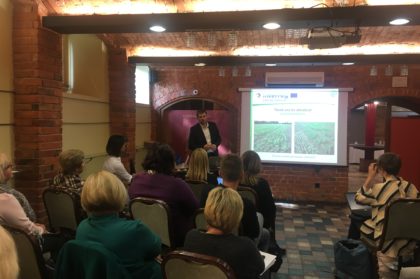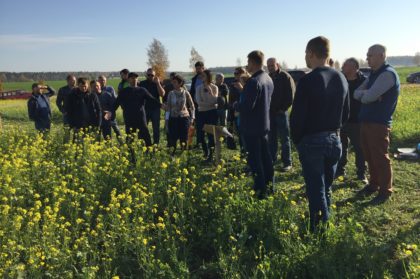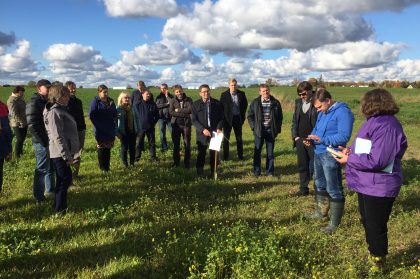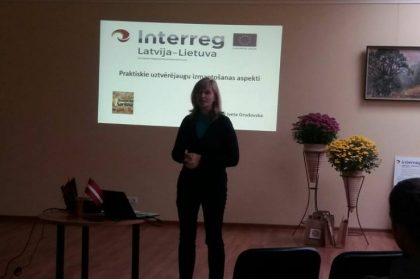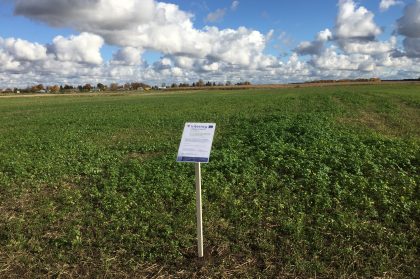2017 m. balandžio mėn. VŠĮ „Aplinkos apsaugos politikos centras“, kartu su partneriais, Aleksandro Stulginskio universitetu ir Žemės ūkio išteklių ir ekonomikos institutu (Latvija), pradėjo vykdyti projektą „Optimalūs tarpinių augalų sprendimai siekiant sumažinti tarptautinių Ventos ir Lielupės baseinų taršą“ (Projekto nr: LLI-49, Projekto akronimas: CATCH POLLUTION). Šį projektą finansuoja Europos Sąjungos 2014–2020 m. Interreg V-A Latvijos ir Lietuvos bendradarbiavimo per sieną programa. Projekto trukmė: 2017 m. balandžio 01 d. – 2019 m. kovo 31 d. Visas projekto biudžetas 230 609 Eur. Iš jų bendrasis Eurpos regioninės plėtros fondo finansavimas 196 018 Eur.
Tarptautiniuose, Lietuvos ir Latvijos teritorijose išsidėsčiusiuose, Ventos ir Lielupės upių baseinų rajonuose (UBR) vis dar gausu taršos problemas patiriančių upių. Nepaisant abiejų šalių pastangų mažinti taršą ir pastebimo miestų taršos sumažėjimo, žemės ūkio taršos efektyviai valdyti vis dar nepavyksta.
Tarpiniai augalai yra pripažįstami kaip viena iš efektyviausių žemės ūkio taršos mažinimo priemonių, kuri tuo pačiu yra naudinga ir ūkininkams, nes leidžia pagerinti dirvožemio būklę ir sumažinti maistinių medžiagų nuostolius. Deja, dėl žinių stokos tarpinių augalų auginimas vis dar nėra labai populiarus tarp Lietuvos ir Latvijos ūkininkų.
Projekto metu siekiama suvienyti kaimyninių šalių aplinkosaugos ir žemės ūkio specialistų pastangas bei žinias identifikuojant optimaliausius tarpinių augalų sprendimus ir bei jų įgyvendinimo poreikį. Siekiama paskatinti aktyvesnį agrarinės aplinkosaugos priemonių įgyvendinimą, aiškiai parodant šių priemonių įgyvendinimo kaštus ir naudą. Todėl projekto metu didelis dėmesys bus skiriamas bendradarbiavimui su ūkininkais, jų organizacijomis bei už vandens išteklių valdymą atsakingomis institucijomis.
Siekiant populiarinti tarpinius augalus, projekto metu Ventos ir Lielupės upių baseinuose, tiek Lietuvoje, tiek Latvijoje, įrengti demonstraciniai laukai. Lietuvoje pasirinkti ūkiai Pasvalio ir Mažeikių rajonuose, Latvijoje – Talsu ir Aucės savivaldybėse. 2017 m. spalio mėn. demonstraciniuose laukuose bus organizuojamos informacinės lauko dienos, kurių metu ūkininkai bus supažindinti su tarpinių augalų įvairove, auginimo technologijomis ir jų teikiama nauda.
Lauko dienos Lietuvoje vyks:
Lielupės upių baseinų rajone 2017 m. spalio 19 d. Vaškų seniūnijoje, Kultūros g. 1, Vaškų mstl., Vaškų sen., Pasvalio r. LT-39373
Ventos upių baseinų rajone 2017 m. spalio 20 d. Viekšnių seniūnijoje, Tilto g. 12, Viekšnių m., Viekšnių sen., Mažeikių r. LT-89492
Renginiai nemokami. Visi besidomintys renginiais dėl detalesnės informacijos Lietuvoje – į Prof. Vaclovą Bogužą (tel. +370 685 43622 ; el. paštas: vaclovas.boguzas@asu.lt).
Daugiau informacijos:
www.aapc.lt
www.latlit.eu
www.europa.eu
Ši informacija parengta naudojant Europos Sąjungos finansinę paramą. Už šio pranešimo turinį atsako VŠĮ „Aplinkos apsaugos politikos centras“. Jokiomis aplinkybėmis negali būti laikoma, kad jis atspindi Europos Sąjungos nuomonę.




